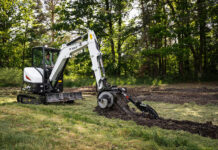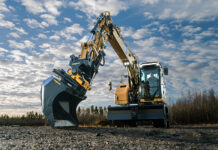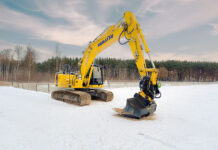
David Marshall was appointed Worsley Plant’s area sales manager for Scotland after impressing MD Sean Heron when he worked on the attachment specialist’s stand at ScotPlant 2014. Since then, he’s played a key role in establishing Worsley’s first Scottish depot in Tillicoultry, Clackmannanshire, and been travelling the country selling products for use in the construction, demolition, waste management and recycling sectors.
David recently told Gary Moug about his four decades in the plant industry, the growing significance of attachment products, and why you should always listen intently when someone tells you how to perform a particular task, even when you already know how to do it…
Q) HOW DID YOU FIRST BREAK INTO THE PLANT INDUSTRY?
A) About 40 years ago I joined P. F. Doggett Engineering (Geith) as a foreman/fabricator/welder. We manufactured excavator buckets and land drainage equipment. When P. F. Doggett closed its Scottish depot, I began my own mobile welding and plant repairs company. I eventually worked for O&K (Orenstein & Koppel) for about 18 years in the opencast coal mining industry as a self-employed mobile welder and plant fitter, working on 200-400-tonne excavators.
I then spent five years as a depot manager for Lemac Engineering, then five years with DM Engineering selling quick-hitches, buckets and attachments. I joined Worsley Plant nearly five years ago as Scottish area sales manager.
Q) WHAT ARE THE BIGGEST CHANGES YOU’VE SEEN IN THE INDUSTRY SINCE STARTING OUT?
A) The biggest one would be the advancements in excavators. When I started they all had stop cables that you pulled to switch them off and no quick-hitches whatsoever. They’re now nearly all computer controlled; they all have hydraulic quick-hitches and a lot of them can now connect up the oil automatically. I believe that is going to become the industry standard.
Q) WHAT BRANDS DO YOU SUPPLY AT PRESENT?
A) We supply MB crushing buckets, Remu screening buckets, Rotar demolition equipment and Lehnhoff quick-hitch systems.
Q) MOST CHALLENGING ASPECT OF YOUR JOB?
A) There is a lot of travelling involved to get round the Scottish customer base and sometimes you have to go the extra mile if possible to try and get a sale. I’ve always followed my conscience and worked with the best attachments available because you need to believe in what you are trying to sell and also I would not like to sell something that I didn’t believe to be the best for the customer.
Q) DO YOU BELIEVE ATTACHMENTS ARE PLAYING A MORE PROMINENT ROLE THAN EVER BEFORE?
A) Yes, I believe the days are gone when customers will make do with the wrong equipment. Now they want the correct attachment for the job and compliant with health and safety requirements. You used to get away with doing things to get the job done that you wouldn’t get away with today.
Q) HOW COMPETITIVE IS THE ATTACHMENTS MARKET AND HOW DO YOU STAND OUT?
A) It’s very competitive. For some customers it’s all about price, but more and more are looking at the bigger picture and looking for quality attachments that should give them years of trouble-free use. Also, the correct tool for the job can save them time and money in the long run.
Q) CAREER HIGHLIGHTS?
A) Being depot manager for Lemac Engineering in Scotland. In its heyday it was the main manufacturing depot for Lemac Engineering in the UK with around 50 employees.
At Worsley Plant I supported our equipment suppliers at Intermat Paris. I’ve also had the opportunity to visit the Remu factory in Finland, the Lehnhoff factory in Germany, and the MB factory in Italy to see the products being manufactured. I’ve also taken customers to Holland, Germany and Belgium to see equipment they were interested in, working to try to get deals over the line.
Q) HOW DO YOU RELAX WHEN YOU’RE NOT WORKING?
A) I’m a keen mountain biker. I also enjoy DIY.
Q) BEST ADVICE YOU’VE EVER RECEIVED?
A) The best advice I’ve had was from my father Ritchie. He told me to always listen when someone tells you how to do a job – even if you already know how to do it, because occasionally you may hear something you didn’t know.
Q) WHAT DO YOU SEE AS THE FUTURE FOR THE INDUSTRY?
A) The plant sector will always be needed as there will always be someone wanting a hole dug out or a building knocked down so they will always need attachments – even if the machines are eventually unmanned. I can see that being the next big thing; that eventually they’ll take all the drivers out of the machines, which they’ve already done in certain instances.















